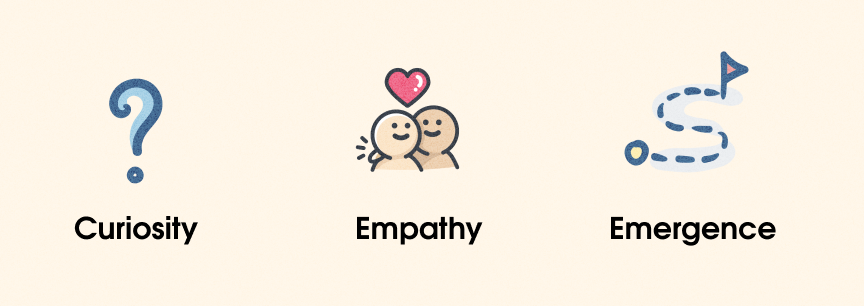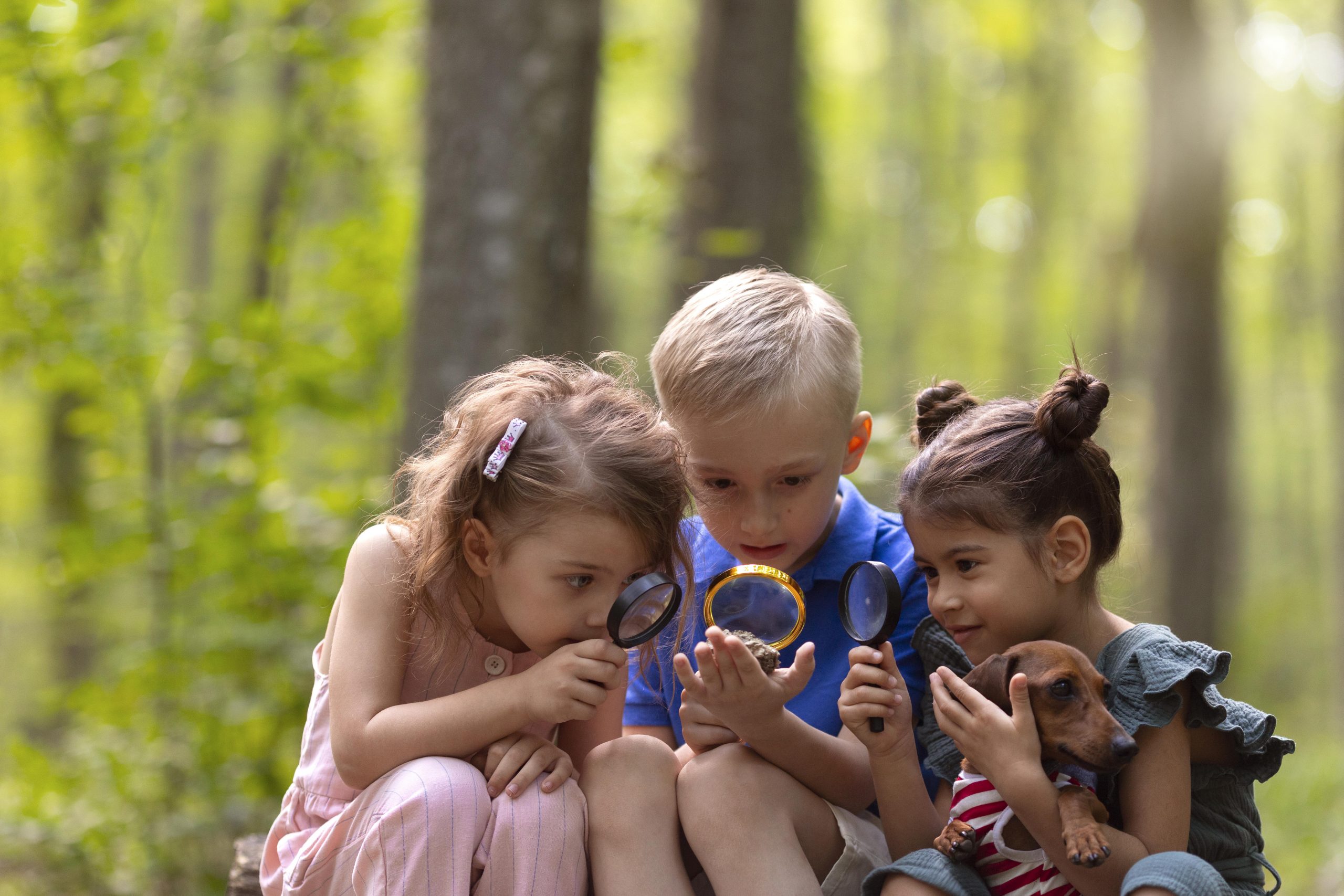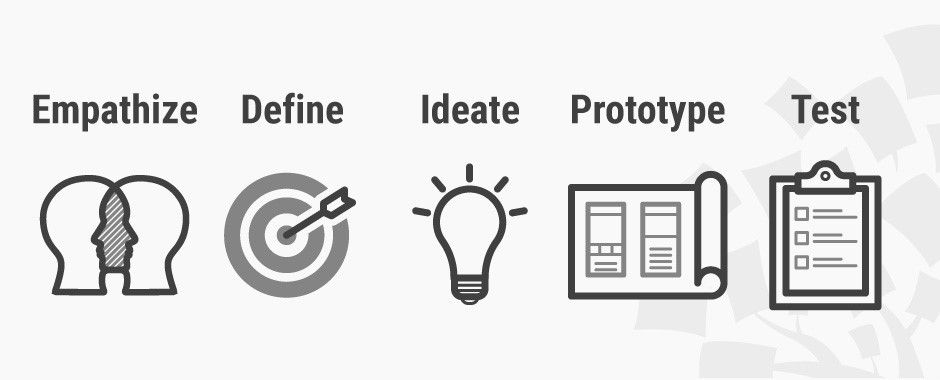Curiosity, Empathy and Emergence
A relational approach to understanding challenges and exploring opportunities
Of all the things that seem in short supply these days, challenges aren’t on the list. At personal, organisational, community, societal and global levels – challenges are constant and, it seems, increasingly complex and interconnected.
How might we approach these challenges in a way that doesn’t confuse the symptoms of the problems? Is there a way forward – a framework perhaps – that can lead to the greater common good? What lies at the heart of these challenges? Are they to be seen and best understood through discrete lenses: political, social, economic, religious, organisational, medical, interpersonal, systemic, or a combination thereof?
It seems that lurking deep (or not so deep) within any challenges is a relational dynamic. Or, more pointedly, a relational vulnerability or frailty. It may be our relationship with ourselves, or our relationship with another (whether that another is a friend, family members, colleague, client, customer, country or cause).
If the lens of relationship can help us to engage in challenges—rather than flee from them, fight them, or freeze in the face of them—what components might make up that lens of understanding? What foundational principles – accessible to all – might move the dial toward more restored relationships, shared solutions and pursuit of common good?
Let me suggest three: Curiosity, Empathy and Emergence.

Curiosity (“And What Else”)
A posture of curiosity can enable us to remain open to the emergence of new opportunities and possibilities; it can help keep fear and angst in check. Curiosity can shine a light on things that matter to us, nudging us to explore options as we move forward amidst challenge and uncertainty.
In my experience of supporting students student success and wellbeing, approaching challenges and uncertainty with greater curiosity has enabled increased levels of resilience and hope. It has created a pathway to a better understanding of values and what really lies at the heart of the matter for students. This curiosity can often be invited and welcomed by the simple phrase, “and what else”. This invitation is a gift to another to start to explore and articulate the context in which they are seeking to navigate a way forward.
How might you bring greater curiosity to the conversations you will have before you today?
Todd Kashdan, PhD, whose research and writing around curiosity, both in academic and popular circles, writes
“Curiosity serves as a gateway to what we value and cherish most. We can reclaim the lost pleasures of uncertainty, discovery, and play from our youth. Being curious opens the door to more than simply striving for happiness. It is a powerful trait that is often overlooked on the road to finding purpose and meaning in life. If we are interested in producing a population of critical thinkers armed with courage, resilience, and a love of learning and discovery, then we must recognise, harness, and cultivate curiosity.”

Empathy (“Listen to Understand”)
This type of active listening is other-focussed. Rather than listening to respond, we create space and are present with others so that they can be more fully understood.
If at the heart of our challenges lies a relational dynamic, then our route to a solution is often in dialogue. For this dialogic approach to work, and for solutions to emerge, we need to approach them with humility and a willingness to listen to what is being said, and perhaps not said. In my coaching work this is key to not only fostering rapport and trust, but to actually be present with someone and help hold a space where, in the words of Parker Palmer, we can know as we are known.
This empathic listening takes patience. It takes courage. It requires being present with an open mindset (and earset). If we listen to understand, rather than to be understood, we too will be invited to share and be understood. In this way, multiple perspectives can emerge and a more fully formed picture of reality can make itself known. In this way, addressing real challenges can be tackled together.
How might you resource yourself to bring greater empathy and a seeking-to-understand approach to the challenges you are facing today?
Emergence (“Solutions Emerge Over Time”)
In addressing challenges, being able to read and understand the context we are seeking to navigate and problem solve in is vital.
You may find yourself in a place where well developed processes and procedures work and serve you and others well.
Or you may find yourself in a context where expertise is required and specialist knowledge adds value and a way forward.
For many of us, however, a great deal of the challenges we face in our organisations are enmeshed in complex adaptive systems. You need to draw on multiple perspectives, and interdisciplinary approaches will facilitate a way forward to what options may emerge and be considered. The way forward is perhaps a range of possibilities. Testing, experimentation and iteration will be required. There’s no singular or known ‘best way’. Solutions here emerge over time.
There are times, of course, to act decisively. There are times to call on expertise and a body of knowledge. But that isn’t always the case.
As you reflect on the challenges and opportunities before you, where might you create space that invites and is hospitable to multiple perspectives, so solutions can emerge?

In working to support individuals, teams and organisations to solve problems and embrace creative solutions, Design Thinking provides a helpful framework. The process of expansive thinking and honing in on new possibilities allows for the navigating of complex challenges, fostering trust and building rapport with multiple stakeholders.
If you are curious to learn more about how you might navigate the challenges and opportunities before your organisation through Design Thinking, reach out here and let’s begin a conversation today.
Rather than seeking greater autonomy and isolation, these three components to a relational approach to challenges—Curiosity, Empathy, Emergence—may in fact allow us to thrive and flourish as humans. Humans who work collaboratively, are attentive to the realities of others and move forward together. Moving forward in our teams, organisations, communities and beyond — rather than retreating, isolating ourselves, and further undermining those relationships that we and others need most.

